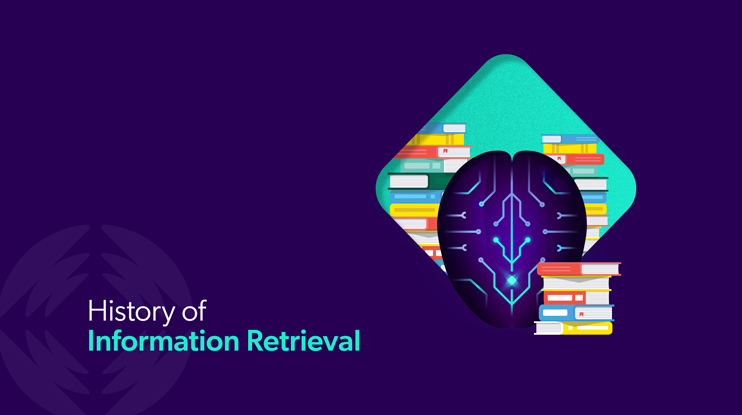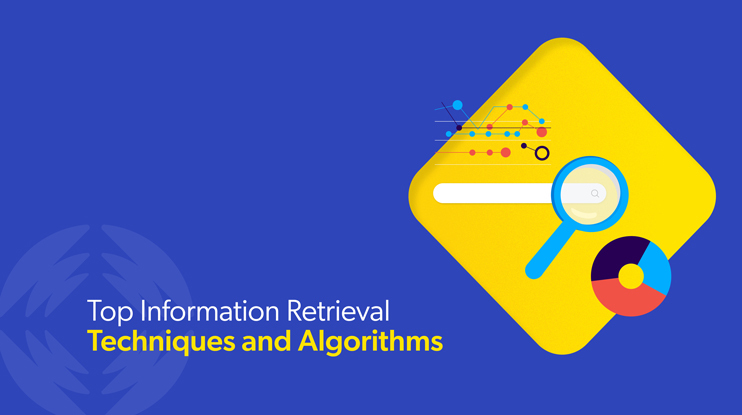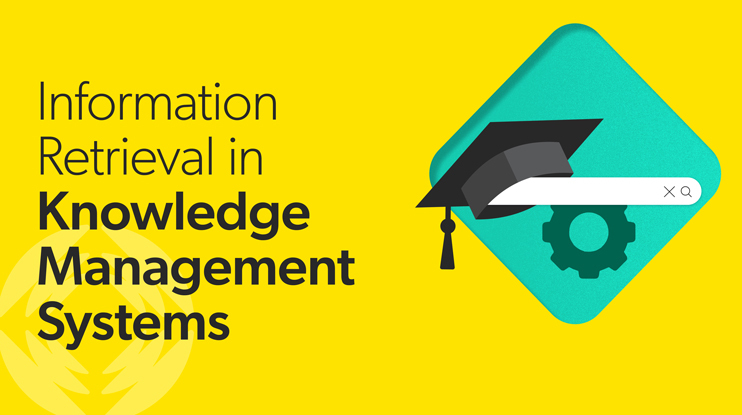Delivering great customer experiences in today’s highly connected, digital age is vital for the growth and success of businesses. A high-quality customer experience differentiates a company, impacting areas like customer retention and brand reputation. Such valued experiences lead to tangible benefits for companies, translating to a 16% price premium on products and services, according to PwC, and greater loyalty.
Information retrieval (IR) is pivotal in ensuring the customer experience is seamless, from a customer’s initial online search on the brand website to customer support following a purchase. Advances in IR, leveraging AI technologies like machine learning and natural language processing (NLP), have made it possible for companies to provide more personalized, intuitive customer experiences.
This is vital as research shows 71% of consumers expect personalized experiences, and 76% will switch to another brand if they are unhappy with their experience. In this blog, we examine how advanced information retrieval systems can significantly enhance customer experiences for your business.
Understanding Advanced Information Retrieval
At its core, information retrieval’s goal is to identify and provide a user with the most relevant information based on a query. The first part of IR is retrieving relevant documents from a collection followed by ranking these documents by their relevance to the query.
Traditional IR systems primarily rely on matching terms or keywords between the query and document, but they struggle with complexities and nuances like polysemy (e.g., “nail”) and synonyms (e.g., “smart” and “sharp”).
Thanks to advances in computing power and AI technologies like deep learning, modern IR systems have achieved levels of accuracy and precision previously unattainable. Advanced information retrieval techniques use NLP, a branch of machine learning employing deep learning algorithms to interpret query intent and accurately match documents.
Several advances in NLP and deep learning, which uses layers of interconnected nodes to detect patterns and relationships in words and phrases, help IR systems understand the query and document context, enabling the systems to navigate the complexities of language. This includes the use of a pre-trained language model such as Google’s BERT, which helps computers understand context and ambiguous language in queries and text, and OpenAI’s GPT, a generative AI model that can respond to queries with human-like text.
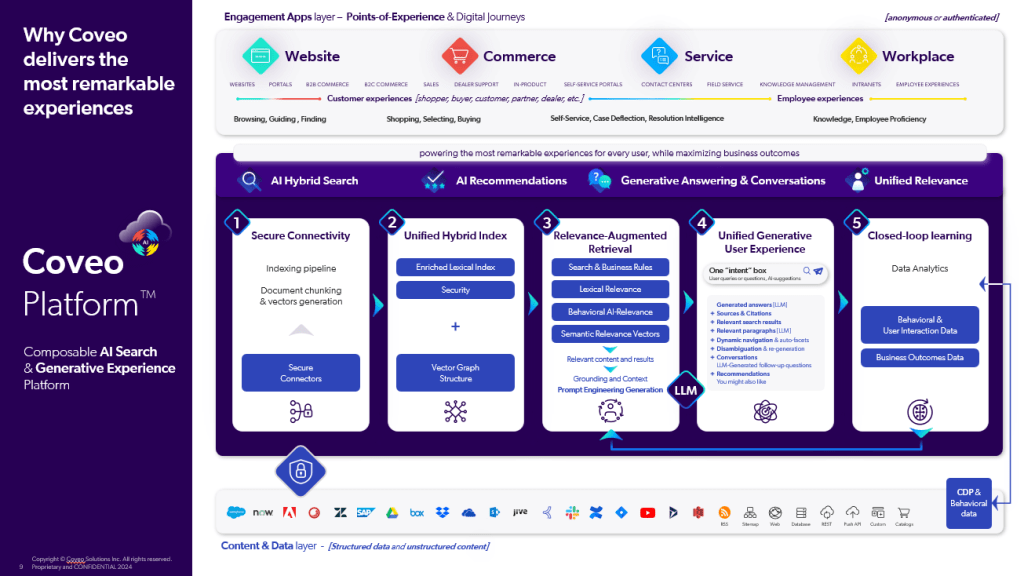
The Business Case for Advanced Information Retrieval
Customer experience encompasses the entire journey between customers and brands. Today’s customers hold high expectations for great, consistent brand experiences that account for their individual needs and preferences. But companies often miss the mark. According to PwC, 54% of U.S. consumers said customer experience at most companies needs improvement. And companies don’t get many chances to get things right. The same report found that 32% of all customers would walk away from a brand they love after just one bad experience.
Customers interact with brands across many channels including social media, email, website and physical stores, and expect consistent experiences across them all. And with many customer’s experiences with a brand starting in the search box of a brand’s website, information systems like search can significantly impact the customer experience.
With advanced information retrieval techniques, which applies artificial intelligence to search, companies are able to collect and analyze large volumes of customer data from many touchpoints and provide consistent answers to queries. Machine learning algorithms that detect patterns and learn from each customer interaction enable advanced IR systems to understand the intent of a search and anticipate customer needs. For example, an AI-driven search tool can make personalized recommendations that drive engagement, such as product recommendations in real time based on a customer’s order history. These capabilities add up to unified and personalized digital experiences that help companies win and retain customers.
Amazon, for example, recently implemented a deep learning algorithm that provides personalized size recommendations for customers on a product page they are browsing. The algorithm, which clusters together customers with similar size and fit preferences along with products with a similar fit, learns from millions of product details to recommend the best fit.

“We’ve learned that customers are more likely to purchase and keep an item when a size is recommended for them,” writes Apoorv Chaudhri, Director of Computer Vision and Machine Learning at Amazon Fashion, in a blog that details the features.
In another example, beauty retailer Sephora first introduced an AI-powered chatbot in 2016, and since then the company has introduced several uses of AI to enhance customer experiences and saw a 4-times increase in online sales over six years.
Organizations that take steps to provide customers with excellent experiences with their brands feel the impacts on their revenue and costs. Companies that excel at personalization produce 40% more revenue from those activities than average companies, according to McKinsey. Improved customer experiences also lead to more satisfied customers, reducing the operational costs of answering customer queries and freeing up more human resources for other strategic tasks.
Challenges Addressed by Advanced Information Retrieval
Despite knowing the importance of customer experience, many companies struggle to overcome challenges to delivering consistent, personalized experiences. Using AI-powered technologies, advanced information retrieval addresses several key obstacles.
Reducing data silos
One of the biggest barriers to a better customer experience for companies is the ability to deliver good experiences consistently across channels.
On average, business buyers interact with companies across 10 channels while consumers use 8 channels, according to Salesforce. Advanced information retrieval uses AI to collect consumer data from multiple channels of interaction, analyze the data and provide personalized search experiences.
AI-driven search also means responses to queries will pull together information from sources across the company to provide cohesive and consistent information to the customer, reducing fragmentation in information.
Decreasing search time and improving findability
For product searches or simple issues, customers prefer to find the information they’re looking for themselves. Customers will get frustrated if it takes multiple clicks to get to a resolution.
Advanced IR processes large amounts of information quickly and utilizes user intent and context to produce relevant information and timely search results, improving information findability for customers.
Enhancing decision making
With the ability to sift through massive amounts of information, from social media posts to website clicks, advanced information retrieval systems can use machine learning to analyze data on customer interactions and deliver insights to the business on customer preferences and needs. For example, by analyzing customer search behavior across channels, a company may find a significant number of customers are searching for a product they did not offer, identifying a gap in their product offerings they need to fill.
Implementing Advanced Information Retrieval: Best Practices
Integrating advanced information retrieval into your existing systems requires careful planning and consideration. We recommend businesses to follow these best practices for a successful transition.
Integrate with existing systems
First, businesses must choose the best method to integrate advanced information retrieval into their existing systems, whether they exist in ecommerce, customer support or customer self-service.
At Coveo, we provide native integrations to popular enterprise applications like Salesforce and SAP, along with a rich offering of connectors to make the integration step easier and avoid costly migrations. This ensures information is connected and unified across the enterprise and its systems.
Choose future-fit technology
In a fluid environment in which customer expectations and technological disruptions keep shifting the demands on the business, companies must prepare themselves to continuously and quickly adapt their technology strategies going into the future.
Organizations should choose to invest in technology like advanced information retrieval systems that are flexible and adaptable to grow with the needs of the business and its customers.
Leverage low or no code solutions
For faster deployments, customers should choose low- or no-code solutions. These can offer prebuilt components that give non-technical employees opportunities for greater involvement in implementing and managing information retrieval systems.
Case Studies: Success Stories
A look at some real-life successes from businesses that implemented advanced information retrieval highlights some of the use cases and benefits of this important technology in improving customer experiences.
Project Management Institute (PMI)
For nonprofit PMI, the organization wanted a visitor’s experience coming from organic web search to seamlessly continue on their website’s navigation.
Using machine learning-powered search that analyzes user behavior to make recommendations, PMI suggested potentially relevant products from a dropdown menu that increased the chances of conversion for its 500,000 monthly visitors.
Machine learning algorithms were key to opening up PMI’s vast library of information to visitors in an accessible and intuitive way, while predictive AI used historical visitor data to improve search results and recommendations for more engaged customers.
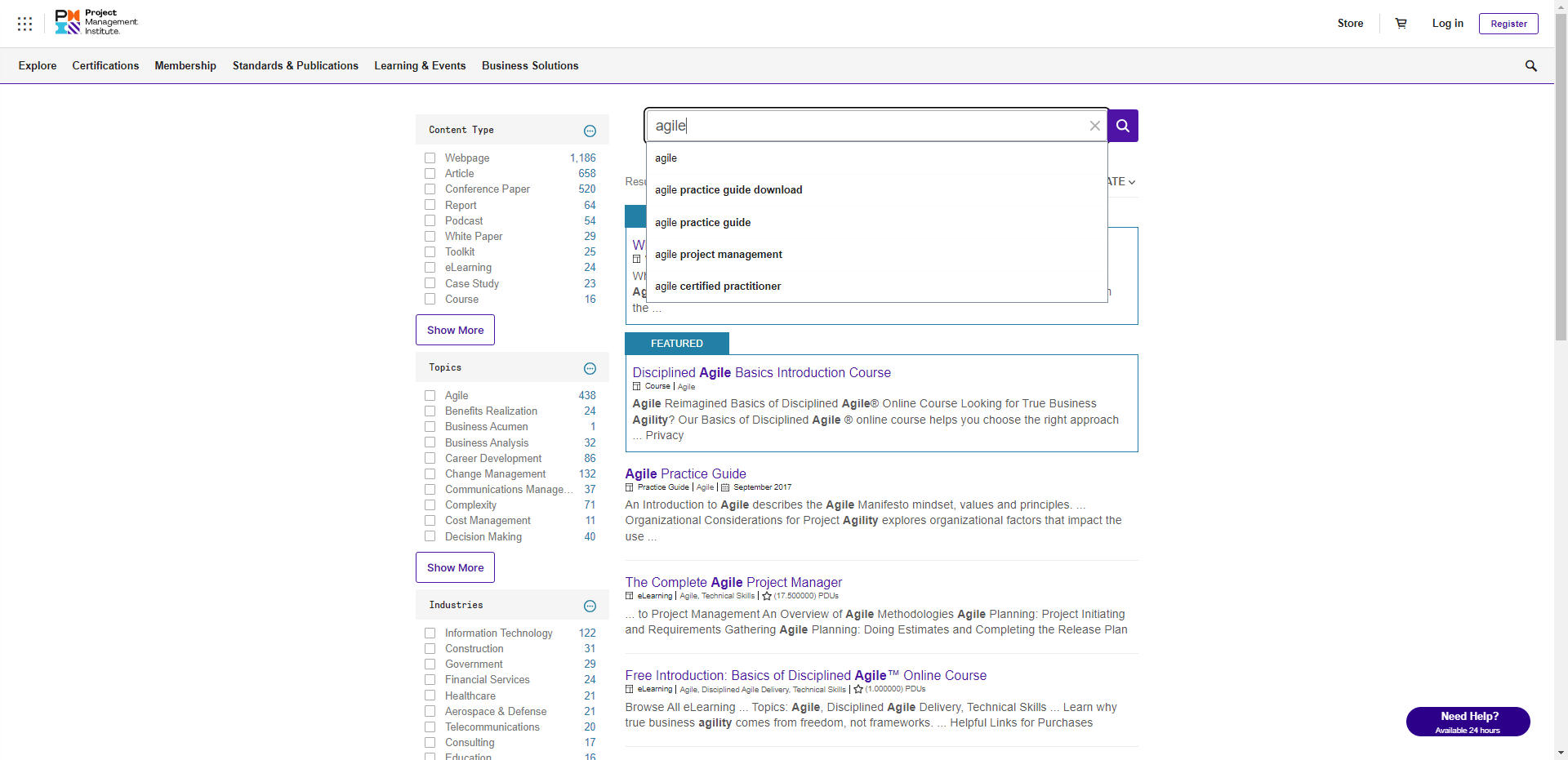
SAP Concur
With Coveo’s AI-driven search engine, SAP Concur created a unified search experience for both customers and agents that accesses knowledge from across the enterprise. Additionally, implementing key AI-powered features such as generative answering, customer and employees receive quick, secure and accurate answers that reduce cases and build trust.
With AI search’s ability to understand the semantics and context of queries, customers also receive the most accurate and relevant information and answers, which boosts organizational efficiency.
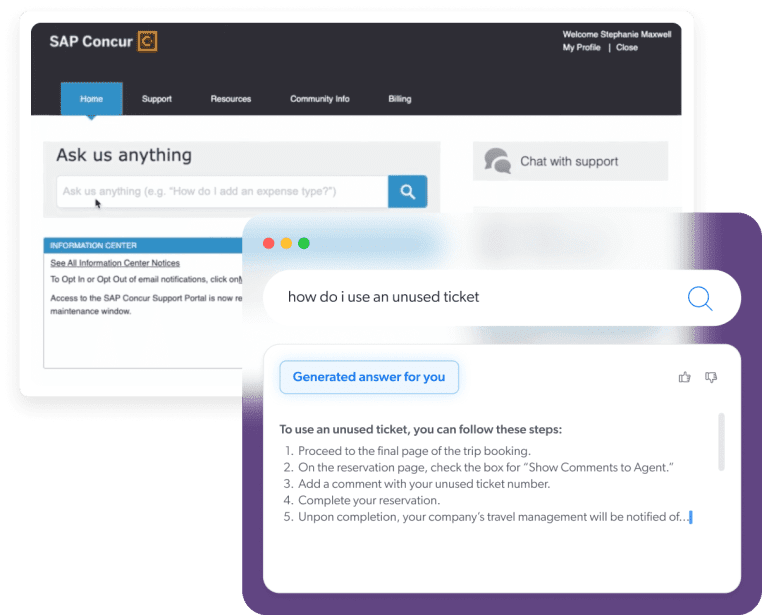
Forcepoint
For security software company Forcepoint, knowledge silos across the organization led to employees and customers struggling to find information and dealing with fragmented experiences.
Using Coveo’s AI-powered search capabilities on a single platform led to the collection and unification of enterprise-wide knowledge, which in turn led to much improved self-service resolutions for customers and greater agent proficiency and efficiency.
Implementing generative answering on top of the engine led to accurate, fast service for its 14,000 customers, resulting in a 14% increase in implicit case deflection.
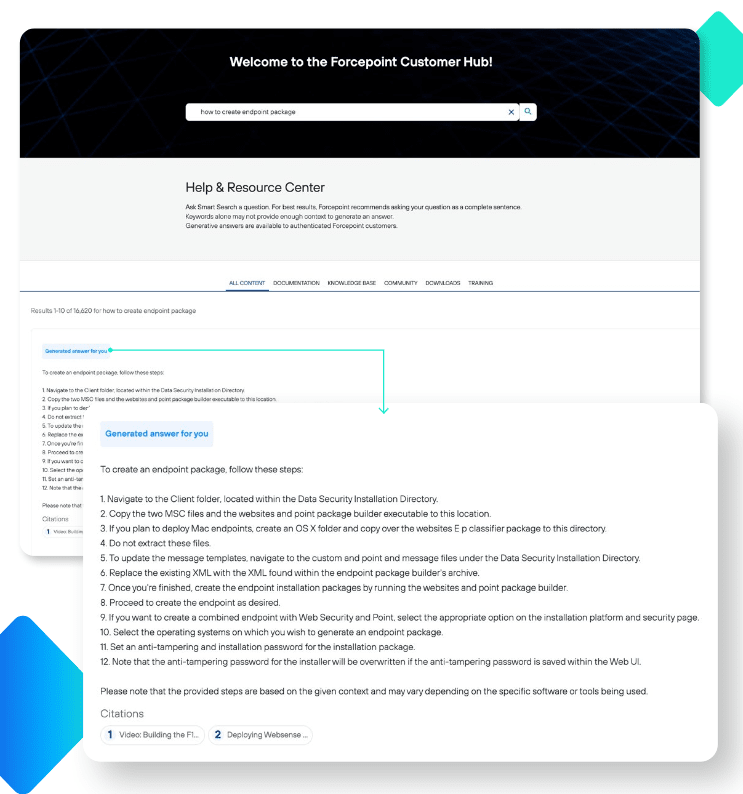
Future Trends in Information Retrieval and CX
Developments in AI that powers advanced information retrieval will significantly influence customer experiences going into the future. Generative AI is a huge and growing market and language models like GPT are poised to forever change customer support by providing increasingly personalized, context-aware and intuitive human-like conversations in a brand’s voice.
Growth in multimodal search like voice search and augmented reality will make customer experiences with brands even richer, changing the way customers take advantage of advanced search systems. In turn, businesses will need to prepare for a future in which information retrieval systems are required to not only process and analyze text, but images, audio and video as well.
Advances in real-time information retrieval will mean AI will increasingly be a partner to humans in areas like customer support, where real-time information becomes crucial in situations that can turn a person into a loyal and happy customer.
The growing use and development in information retrieval of machine learning, which learns from data and improves over time, in areas like natural language processing will mean customers will receive increasingly personalized search results and recommendations tailored just for them.
Taking the Next Step
Companies that successfully deliver excellent customer experiences at every step of the journey will come out ahead of their competitors.
Advanced information retrieval, with the ability to collect and unify data from all of your customer interactions and then make predictions on how to best answer customer queries, will be a critical technology in improving and delivering connected, consistent customer experiences.
Start implementing AI-powered search in your systems to better serve your customers; explore our demo hub to see first-hand how to uplevel your customer experience.




